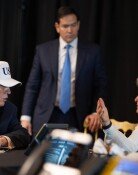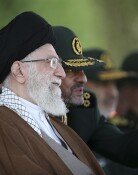Jo Myong-Rok¡¯s visit to U.S. is a 1st step
Jo Myong-Rok¡¯s visit to U.S. is a 1st step
Posted October. 09, 2000 15:00,
With North Korean Defense Commission Chairman Kim Jong-Il's plenipotentiary emissary Jo Myong-Rok' visit to the United States as a momentum, Washington and Pyongyang are likely to come out all out to improve five decades of hostile relations.
In a joint statement, the United States and North Korea announced their consensus to oppose all kinds of terrorism, paving the way for the U.S. government to remove the communist state from the list of terrorism sponsoring states.
Accordingly, a major stumbling block standing in the way for the improvement in their bilateral ties has been cleared, and the two countries are expected to explore concrete ways of normalizing their relations.
Of course, most concerned is what the North Korean envoy brought with him to be bared at the projected talks with Washington. As for the issue of terrorism, Washington is in the position that because of the legal stipulations, it is difficult to remove the North from the list of terrorism-sponsoring states, as long as the North permits the Japanese hijackers of Japan Airlines¡¯ Yodo airliner to stay in the communist state.
The United States also maintained that the policy that the conclusion of a peace treaty to replace the armistice agreement should be addressed between South and North Korea, actual parties of the 1950-53 Korean War but not between the United States and the North.
The question of the U.S. military presence in Korea should be addressed between the parties concerned between Washington and Seoul but not with Pyongyang, the U.S. government asserts.
Moreover, while the North Korean missile and nuclear development issues are not resolved, the fast improvement in their bilateral ties is hardly expected. But the possibility is raised that the two sides will make progress in the talks for the establishment of liaison offices, depending on the Pyongyang attitude.
The fact that U.S. President Bill Clinton said that he would hear from the visiting North Korean envoy first in reply to a press question might imply that the bilateral relations could make progress only when Pyongyang comes up with a change in its position.
On the other hand, as the Pyongyang leadership is well aware of this Washington position, there is a high possibility that envoy Jo brought with him Kim Jong-Il's message containing substantial steps to meet the U.S. propositions.
On the part of North Korea, apparently considering that its improvement of relations with the United States is essential for safeguarding its ruling system, Pyongyang will be trying to take full advantage of Jo's American visit for its goal. As Pyongyang completed the preparations for that, it offered the United States to send Jo as a special envoy, diplomatic observers in Washington speculated.
The issuance of the joint statement on the opposition to terrorism might have intended to lift a burden on the North, as the removal of its name from the terrorist list could lead the country to receiving loans from international organizations such as the International Monetary Fund and the World Bank to overcome its economic difficulties.
Earlier, Washington changed its description of North Korea from rogue state to apprehensive state in June and eased its economic sanctions against the North significantly, thus taking actions step by step toward the improvement of mutual ties.
In this vein, Washington patched up a discord with Pyongyang in a hurry, when Kim Yong-Nam, chairman of the presidium of the North Korean People's Supreme Assembly canceled his U.S. visit in protest against airport security officers' body search of him and his entourage at the Frankfurt Airport in early September.
From this standpoint, Jo's visit to the United States could make a breakthrough in bilateral relations but will stop short of addressing all the outstanding issues between the two countries, observers said.
Han Ki-Heung eligius@donga.com







